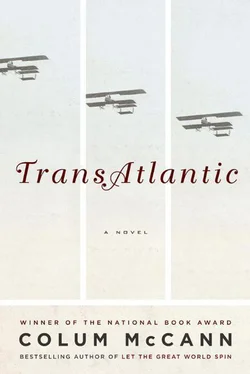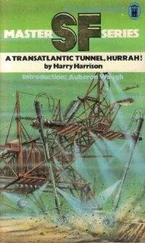Perhaps the reason for her trip was to unhem herself from routine. To throw an added pulse into her days. She and Lottie had been side by side in the Cochrane Hotel for so many years. The room was tiny but they would have been perfectly able to move around each other blindfolded.
ON DECK, THE badminton matches unfolded. Emily noticed the arc of the shuttlecock from a distance, the way it caught in midnight and hovered as if arrested by some magnetism that lay inside the ship and then, when hit in the other direction, lazed for a moment, woke to the possibility of wind, shot forward once more.
Lottie came up from the cabin, wearing a long skirt, whisking a borrowed racquet through the air. A live wire. Always had been. No airs, no graces, but shot through with an electricity, a free-floating awe. She was not pretty, but it hardly mattered. She was the sort of young woman whose laughter could be heard around distant corners. She was quickly partnered up for mixed doubles.
A waiter patrolled the deck with a tray of drinks held high over his head. An old Serbian couple walked hand in hand: they were returning, they said, from their experiment of America. Two beautifully dressed Mexican men walked beneath the gloss of their hair. A marching band practiced at the bow. Emily watched the progress of the funnel shadow as it moved across the deck, slowly traveling from one side of the ship to the next.
It astounded her to think that her own mother had been on a coffin ship some eighty years before, a floating boat of fever and loss, and here she was, now, with her own daughter, traveling to Europe, first class, on a vessel where the ice was made by an electrical generator.
SHE LEFT THE dining room, her cane striking off the boards. Gradations of darkness over the water. No moon. Starlight skittered on the high waves. The lights seemed to rise from the ocean. In the distance the sea seemed so much blacker than the sky. The deck was wet with spray. Every now and then the engines calmed and the ship took on a running pace and the silence was immense.
She slowly negotiated the staircase towards the cabin. A steward accompanied her. She bid him good-bye, ached her way into bed. Later in the night she heard voices in the corridor. They drifted and merged, faded and reappeared. She could hear a smatter of laughter and then there was silence for a moment, the sound of closing doors, a distant thump that seemed to come from up on deck, like dancing, a smash of a glass, and voices drifting on the air. She turned the pillow, tried to find the cool side.
The lock on the door finally turned. The breathing slowed. Lottie had been drinking. Emily heard her dress fall exhausted to the floor. The opening of the trunk. A bare foot righting itself on the floor. A slight giggle.
Emily watched her daughter slip into bed.
SHE HAD NEVER been party to love herself. Not even a husband. Just a man who had come along and eventually disappeared. Vincent Driscoll. A newspaper editor in St. Louis. A sheen to his high forehead. Ink on his fingers. He was forty-two years old. He kept a picture of his wife in his wallet. Emily was a secretary in the advertising division. High-buttoned blouses and an amethyst brooch. Twenty-five. She harbored ambitions. She submitted an article about the Women’s Christian Temperance Union. She knocked on the editor’s door. Driscoll said she had a feminine style. Florid and overwrought. He himself spoke in hard, clean, clipped sentences. He put his hand on the low of her back. He seemed to take some cynical pride in the way she allowed the hand to remain.
He took her to the Planters House Hotel. He ordered fried oysters, saddle of antelope, a Gruaud Larose. Upstairs, straps fell lightly from her shoulder. The damp white loaf of his body shuddered.
She wrote another article and then another. He took a pencil to them. He said he was grooming her. The spring floods of the Mississippi. A boiler explosion on Franklin Avenue. The shooting of a bear in Forest Park Zoo. Tom Turpin and his Harlem Rag , the Negro music down on Targee Street. He edited the stories closely. She opened the paper one day in 1898 to see her first-ever article there: a meditation on the legacy of Frederick Douglass, dead three years. She had written every word herself. The byline read: V. Driscoll. She felt hollowed out. She swayed. In the hotel, Driscoll pushed against his expansive white suit. His jacket never buttoned without obvious strain. His bottom lip twitched. The appearance of the article in the paper should have thrilled her. How dare she. She should thank him. He was allowing her his name. Their collaboration alone should have been enough. She wandered along the riverfront under a red sky. She heard the newsboys shouting out the name of the paper. Her own words within. She walked to her rooming house on Locust Street. A tiny room with an enamel washbowl and a wooden towel railing. Her few clothes hung lifeless in a carved wardrobe. A small desk folded down from the wall. She made a table entirely from books. She struck the nib against the paper. She would bide her time.
She climbed the stairs of the newspaper office once more. Slid her copy across his desk. He looked up at her and shrugged. V. E. Driscoll, he said again. His concession. The E for Emily. Their secret.
Fireworks shot up over St. Louis. The twentieth century was an explosion of color. In the hotel room she eased her ankles around the back of Driscoll’s knees. He raised the bed sheet as if it were a white flag. She attached the word spread to his life: his forehead spread, his waistline spread, his fame, too. She waited. She was not sure for what. It sickened her. His control. His bearing. The way she allowed it. On the street the Driscoll name was called out by newsboys. Emily walked away. She felt a stirring. A sickness in the morning. She began to carry. It stunned her. She thought briefly of visiting a doctor, decided against it. There would be no father, she was a woman beyond her times, she had suffered for it but she did not care, convention didn’t enthrall her. The dampening of love had shed more light on its nature than any actual experience of it. All she wanted, she said, was her name. Her real name. There was no room for a woman writer at the paper, he said, not beyond the society page. Never had been. She touched her stomach. She mentioned a pregnancy. He blanched. The child might, she said, have real lungs for the world. He spread his palm gently on his giant wooden desk, but his knuckles were white. It was, he said, blackmail. She sat demurely. She moved her fingers in the well of her dress. A portrait of his children sat on the desk. He tapped his pencil on the edge of it. Initials only, he said. She would have to continue to write under Driscoll and then she would have a second column, E. L. Ehrlich. It had enough of a male ring to it. She could live with that. It was hers alone. The L for Lily .
She gave birth to the child in the early winter of 1902. At night, when the baby slept, she wrote again, meticulous with each sentence. She wanted her articles to have the compression and rhythm of poems. She pushed the words towards the edge of the page. Worked and reworked. The cutting contests in the Rosebud Café, where the musicians pounded hard on the piano keys. A meeting of anarchists in the basement of a tenement in Carr Square. The bare-knuckle boxing fights down near the newsboys’ home on Thirteenth Street. She was in the habit of writing at tangents so there were times that she would stray into a treatise on the patterns of bird migration along the Missouri, or the excellence of the cheesecake that could be found in the German diner on Olive Street.
She liked her aloneness. At times, over the years, she had met men who showed interest in her. A vendor of Persian carpets. A tugboat captain. An elderly survivor of the Civil War. An English carpenter who was creating an Eskimo village for the World’s Fair. But she gravitated to aloneness. She watched the back of their jackets as they left, the creases made by their shoulder blades. She was left walking with her daughter along the riverbank. Their breathing melded. Their dresses moved harmonically. She found herself an apartment on Cherokee. She splurged on a typewriter. It clattered through the evening. She wrote Driscoll’s column. She didn’t mind. She even enjoyed inhabiting his narrow mind. For her own column she felt as if she were stretching every cartilage. A happiness came over her. She combed her daughter’s flare of hair. There were days of great release: she felt as if she was hauling herself from the depths of the well.
Читать дальше












